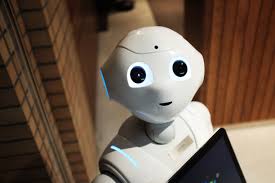Source: nation.co.ke
On the other hand, businesses looking to inject efficiencies in their work and make more money are enchanted by the palette of possibilities wrought by technology.
To investors, technology means bigger and better business.
For many, the term “artificial intelligence” is a complicated topic reserved for hard-nosed tech titans — but that’s a false premise.
Anyone can understand it, at least its application. It’s a topic we can’t run away from as it is becoming part of our daily lives.
FEAR
When computers and their programmes are attuned to carry out tasks previously only possible through human intelligence, that’s artificial intelligence at work.
This intelligence improves as computers feed on copious amount of data and sharpen the accuracy of their decisions.
But in strict terms, defining “intelligence” is much more complicated — a topic that can better be abstracted in a class.
Africa is leapfrogging the rest of the world in its application of artificial intelligence and use of robots.
But it’s not hyperbolic to state that artificial intelligence-powered robots are increasingly becoming a common phenomenon — from ATMs, to traffic lights, smart surveillance cameras, to all those apps that stalk us online, sense what we are looking for, find it and sell it to us.
The notion that automation is an ominous job-eater is one that is discussed in many forums. To those in support of this notion, their construct is built on fear. But automating routine tasks should be embraced.
EFFICIENCY
Human beings are resilient and adaptable. When we bequeath some tasks to computers, we create space to unleash our unmatched creativity that leads to new frontiers and new work. Work that dignifies and delights.
When ATMs were introduced in the 1980s, for example, many thought they spelt doom for bank tellers.
The number of tellers per bank shrank, but because ATMs reduced the cost of operating a bank branch, more branches opened, which in turn hatched out more tellers.
Businesses welcome automation because it brings efficiency, and efficiency — in both time and money — improves a business’s bottom line.
When computers take over some human tasks within a business, those businesses grow faster, not slower.
GROWTH
The growth can only slump if people in the affected industries throw their hands in the air crying victim, instead of adapting and opening new fields where computer intelligence pales in comparison to our God-given brainpower.
One point bears emphasis: technology, used well, helps more that it hurts. It makes business better.
It frees us from trite tasks so that we can unleash creativity and open floodgates of possibilities. Technology won’t supplant us; at least not in the foreseeable future.


